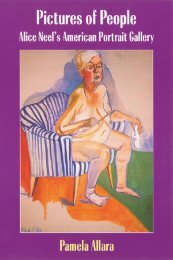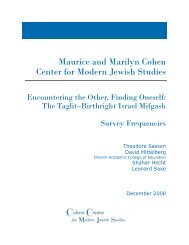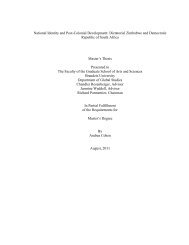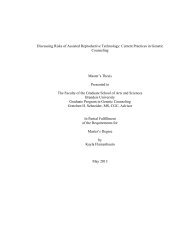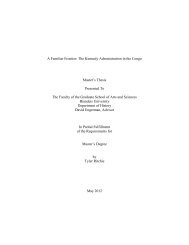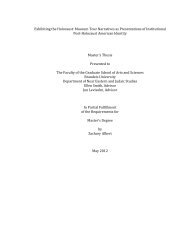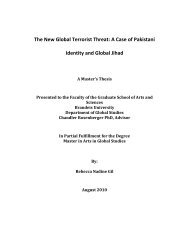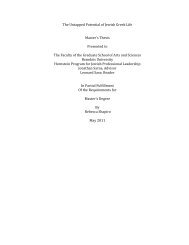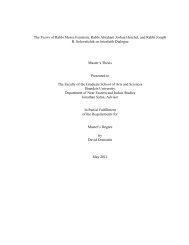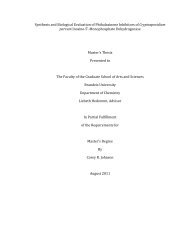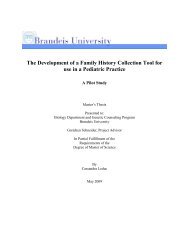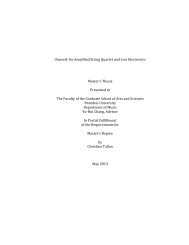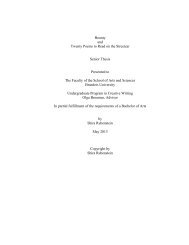Ezra Taft Benson and the State of Israel - Brandeis Institutional ...
Ezra Taft Benson and the State of Israel - Brandeis Institutional ...
Ezra Taft Benson and the State of Israel - Brandeis Institutional ...
- No tags were found...
Create successful ePaper yourself
Turn your PDF publications into a flip-book with our unique Google optimized e-Paper software.
about Jews <strong>and</strong> <strong>Israel</strong>, throughout <strong>the</strong> early days <strong>of</strong> <strong>the</strong> Yishuv (pre-state Jewishcommunity in Palestine) to <strong>the</strong> present, noting <strong>the</strong> changes in perspective occasioned byWorld War II <strong>and</strong> <strong>the</strong> Holocaust. These studies reveal a great variance <strong>of</strong> opinion on <strong>the</strong>Jewish question. Yet, when compared with Mormon viewpoints, especially those <strong>of</strong> <strong>Ezra</strong><strong>Taft</strong> <strong>Benson</strong>, <strong>the</strong> studies also reveal certain similarities between Latter-day Saint <strong>and</strong>o<strong>the</strong>r Christian perceptions <strong>of</strong> <strong>Israel</strong>.Michelle Mart, in an article that attempts to explain <strong>the</strong> changing Christianrelationship with Jews in 1950s America, illustrates some <strong>of</strong> <strong>the</strong> complexity within <strong>the</strong>American-Christian community <strong>and</strong> how <strong>the</strong>y viewed <strong>Israel</strong>. She notes how <strong>the</strong> threat <strong>of</strong>Communism caused many American Christians who had previously distanced <strong>the</strong>mselvesfrom Jews because <strong>of</strong> <strong>the</strong>ir refusal to accept Jesus as <strong>the</strong> Messiah, now (especially after1967) saw <strong>the</strong>m as an ally in <strong>the</strong> fight against <strong>the</strong> spread <strong>of</strong> “godless Communism.” 84Because <strong>of</strong> this perceived alliance with <strong>the</strong> Jewish people, many Americans began to lookmore kindly on a Jewish <strong>State</strong> in <strong>the</strong>ir Biblical homel<strong>and</strong>. 85O<strong>the</strong>r scholars explain thatfor Americans <strong>Israel</strong> represented a solution to <strong>the</strong> Jewish problem <strong>of</strong> Europe, 86 <strong>and</strong> formany Christians, fulfillment <strong>of</strong> ancient prophecy. 87In <strong>the</strong> days leading up to World WarII, during <strong>the</strong> Yishuv in Palestine, <strong>the</strong> Pro-Palestine Federation <strong>of</strong> America, whichconsisted <strong>of</strong> pro-Zionist Christian leaders, worked with Zionist groups to acquireassistance for Palestinian Jews. 88Michael Oren describes how after World War II, asJews continued to languish in camps across Europe, American Christians “hound[ed]8485868788Michelle Mart, “Christianization <strong>of</strong> <strong>Israel</strong> <strong>and</strong> Jews in 1950s America,” Religion <strong>and</strong> American Culture:A Journal <strong>of</strong> Interpretation 14, no. 1 (2004), 112.Mart, “Christianization <strong>of</strong> Jews,” 119.Oren, Power Faith <strong>and</strong> Fantasy, 483.Mart, “Christianization <strong>of</strong> Jews,” 116-119; see also Oren, Faith, Power <strong>and</strong> Fantasy, 488.Oren, Power, Faith <strong>and</strong> Fantasy, 425.32



